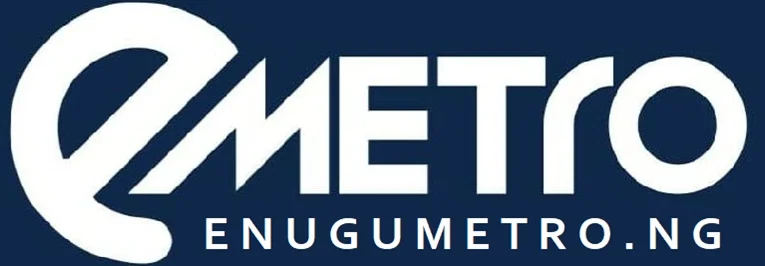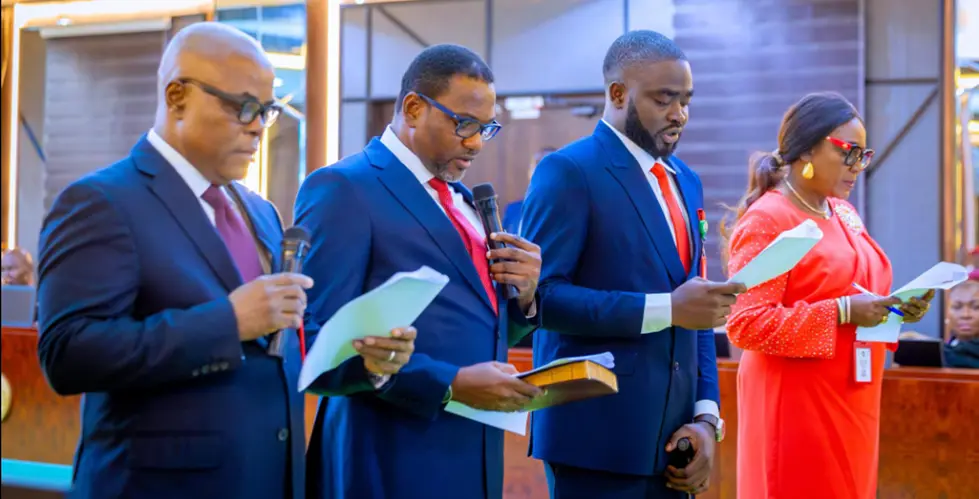Citizens seeking understanding of Gov Peter Mbah’s recent cabinet reshuffle have continued to inundate editors of Enugu Metro with questions.
On Tuesday, Gov Peter Mbah swore in six new commissioners approved by the State House of Assembly and assigned portfolios to them. This was a significant cabinet reshuffle that led to swapping of three cabinet positions and swearing in of six new commissioners.
However, the State did not provide information on the professional profiles of the new appointees as well as the identity of commissioners they were to displace.
Closing the information gap
The questions received from citizens to Enugu Metro are summarized as follows:
- Government appointed six new commissioners but did not announce those that they replaced. Did government create six new ministries for the new appointees?
- If not, did the governor dismiss or reassign the former commissioners or did they resign, like Mrs. Adaora Chukwu? What happened to the previous office holders?
- What were the performance or political considerations behind the cabinet reshuffle?
- What relevant experience are the new appointees bringing to the job since government did not make their profiles public?
How it all started
On Tuesday, 22 July 2025, Governor Peter Mbah executed a classy cabinet reshuffle, devoid of controversy. He welcomed a head of service, swapped portfolios of three old cabinet members, and brought six new commissioners on board.
The Governor urged the new appointees to hit the ground running, stressing measurable performance and teamwork to meet the administration’s high-impact development goals.
However, apart from the former Commissioner for Trade, Investment and Industry who made her resignation public, citizens know nothing about those that would have dropped out of the cabinet to accommodate six new appointees.
The new commissioners who were sworn in on Tuesday include:
| COMMISSIONER | PORTFOLIO |
| Engr. Benjamin Osita Okoh | Works and Infrastructure |
| Prof. Benedett Ekwutosi Okoli | Human Development and Poverty Eradication |
| Enyinna Franklin Ogbonna | Energy and Mineral Resources |
| Prof. George Ugwu | Health |
| Engr. Ben Collins Ndu Jr. | Water Resources |
| Dr. Samuel Ogbu-Nwobodo | Trade, Investment, and Industry |
At the swearing in event, the governor also announced the redeployment of the following cabinet members:
| COMMISSIONER | FROM | TO |
| Dr. Felix Nnamani | Water Resources | Labour and Employment |
| Dr. Malachy Agbo | Human Development | Information |
| Engr. Gerald Otiji | Works & Infrastructure | Housing |
Understanding Mbah’s cabinet reshuffle
Our investigations show that three cabinet positions were hitherto vacant while the governor created a new Ministry and dropped two commissioners to accommodate the six new appointees.
1. The three vacant cabinet positions
Between August 2024 and July 2025, three commissioners left the cabinet. They include:
- Information: On Wednesday14 August 2024, Information Commissioner Eze Akah Eze withdrew from the cabinet to contest the chairmanship of Udenu Local Government Area. He won the election but government did not name a replacement for Information.
- Housing: On Saturday 21 August, the State Chapter of the Peoples Democratic Party (PDP) elected the Housing Commissioner, Dr. Martin Chukwunweike as party chairman. For a while, he combined the positions but has now given the Ministry up with the redeployment of a substantive Commissioner.
- Trade, Investment and Industry: On 17 July 2025 when government submitted a list of new appointees to the House for confirmation, Mrs. Adaora Chukwu resigned as Commissioner for Trade, Investment and Industry. He was replaced by Dr. Ogbu-Nwobodo who previously served as CEO in one of her Ministry’s parastatals.
2. The new ministry created
Gov Mbah created a new Ministry of Energy and Mineral Resources to which Enyinnaya Ogbonna was appointed as a cabinet-level manager.
3. Two commissioners dropped
The above leaves two positions for which new heads were sourced from an old and a new commissioner. It is therefore clear, by inference, that the Governor dropped only two commissioners, including:
- Prof Emmanuel Obi (Health). Mbah inherited Prof Obi from the previous Administration where he also served as health commissioner.
- Mr. Chika Ugwoke is also leaving the cabinet as Commissioner for Labour and Employment.
It is not known if the duo would be given a different assignment since the government did not officially announce their sack or resignation.
Missing Public Profiles

On Tuesday, 22 July, when government announced a list of six new commissioner nominees, their profiles were missing. Subsequently, Enugu Metro dug deep to unearth four profiles out of the six commissioners to fill the information gap.
Observers noted that last Tuesday’s ceremony marked an improvement on the 11 August 2023 swearing in at least one respect. The profiles of the first set of 20 commissioners and their assigned portfolios were not disclosed to the public.
Apart from the profiles published by Enugu Metro, citizens still do not know who two of the commissioners are and how their qualifications fit into the roles to which they were assigned.
- Enyinnaya Franklin Ogbonna who has taken charge of Energy and Mineral Resources, a new Ministry.
- Engr. Ben Collins Ndu Jr. who is the commissioner for Water Resources. What is public knowledge is that he is the son of a former Enugu West Senator and a member of SSG-led inspection team for Enugu Smart Green Schools and Type 2 Health Centre projects.
Conclusion
Olufemi Kayode, an Abuja-based communications consultant said it would be a matter of concern if government fails to disclose to the public the professional or public service background of those they are appointing to manage people’s welfare.
“It denies the people the right to know the qualifications of new appointees managing their affairs and their expected contributions to governance,” he said.
In a response to our written query, he offered the following advice:
“Failing to disclose the identity and professional profile of cabinet appointees is unwise for a governor or president in a democratic setting. It undermines transparency, accountability, and public trust, and the implications can be both immediate and long-term:
- “This lack of knowledge also tends to undermine institutional credibility as a ministry led by an unknown or unqualified person risks being viewed as a political toy, not a serious institution. This perception can hurt donor confidence, inter-agency collaboration, and bureaucratic morale.
- “When a governor or president withholds information about who is running key ministries, this erodes public trust because it suggests secrecy or possible favoritism. Citizens may suspect that appointments are based on loyalty, cronyism, or political reward rather than merit.
- The practice weakens accountability because, without knowing a commissioner’s professional background, citizens and civil society cannot assess their competence, track record, or integrity. This makes it harder to hold them accountable for their decisions or performance.”

